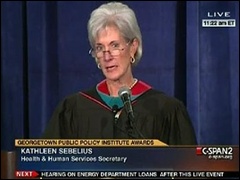
In her remarks, Sebelius couldn’t resist wading into the area of church/state relations. Toward the end of her speech, she said the following:
Ultimately, public policy is about making difficult choices. Today, there are serious debates underway about the direction of our country – debates about the size and role of government, about America’s role as a global economic and military leader, about the moral and economic imperative of providing health care to all our citizens. People have deeply-held beliefs on all sides of these discussions, and you, as public policy leaders, will be called on to help move these debates forward.
These are not questions with quick and easy answers. When I was in junior high, John Fitzgerald Kennedy was running for president. I wasn’t old enough to vote, but it was the first national campaign I really remember. Some of then-Senator Kennedy’s opponents attacked him for his religion, suggesting that electing the first Catholic president would undermine the separation of church and state, a fundamental principle of our democracy. The furor grew so loud that Kennedy chose to deliver a speech about his beliefs just seven weeks before the election.
In that talk to Protestant ministers, Kennedy talked about his vision of religion and the public square, and said he believed in an America, and I quote, “where no religious body seeks to impose its will directly or indirectly upon the general populace or the public acts of its officials – and where religious liberty is so indivisible that an act against one church is treated as an act against us all.”
Kennedy was elected president on November 8, 1960. And more than 50 years later, that conversation, about the intersection of our nation’s long tradition of religious freedom with policy decisions that affect the general public, continues. [emphasis added]
Note in particular the paragraph in bold, in which she quotes President Kennedy. And then think about the controversy surrounding the HHS Mandate.
One wonders if Sebelius has really thought through the implications of the words she quotes from JFK.
Clealry, to her mind, institutions such as those run by the Catholic Church are “seek[ing] to impose” their will onto others when these institutions balk at being required to provide their employees with free contraceptives, sterilizations, and abortion-inducing drugs.
But in reality, just the opposite is happening.
Under the HHS Mandate, the federal government is imposing its will on religious institutions run by churches who believe such “services” are morally wrong.
Note also the second part of President Kennedy’s remarks: Sebelius remarked that Kennedy believed in an America “where religious liberty is so indivisible that an act against one church is treated as an act against us all.”
Ironically, this is exactly what those of us who oppose the HHS Mandate have been saying all along.
Despite repeated attempts by the media to portray the fight over the HHS Mandate as merely a “Catholic” issue, it is not merely an assault on the religious freedom of Catholics.
Rather, the HHS Mandate is an assault on the rights of all Americans.
In recent weeks, Kathleen Sebelius has admitted that she didn’t even bother consulting Supreme Court decisions on religious liberty before she promulgated the HHS Mandate.
Perhaps, however, she consulted the words of JFK that she so badly misinterpreted.
